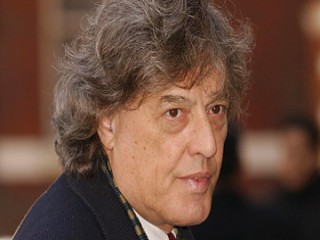
Tom Stoppard biography
Date of birth : 1937-07-03
Date of death : -
Birthplace : Zlín, Czechoslovakia
Nationality : British
Category : Famous Figures
Last modified : 2011-11-25
Credited as : playwright, Arcadia,
1 votes so far
Tom Stoppard was born "Tom Straussler" in Zlin, Czechoslovakia on July 3, 1937. His family moved to Singapore in 1939 to escape the Nazis. Then, shortly before the Japanese invasion of Singapore in 1941, young Tom fled to Darjeeling, India with his mother and brother. His father, however, Eugene Straussler, remained behind and was killed during the invasion. In 1946, the family emigrated to England after Tom's mother married Kenneth Stoppard, a major in the British army.
At the age of 17, after just his second year of highschool, Stoppard left school and began working as a journalist for the WESTERN DAILY PRESS (1954-58) and the BRISTOL EVENING WORLD (1958-60). He began to show a talent for dramatic criticism and served for a time as freelance drama critic for SCENE (1962-3), a British literary magazine, writing both under his own name and the pseudonym William Boot. He also started writing plays for radio and television and soon managed to secure himself a literary agent.
Stoppard's first television play, A Walk on the Water (1963) would later be adapted for the stage as Enter a Free Man (1968). Over the next few years, he wrote various works for radio, television and the theatre including "M" is for Moon Among Other Things (1964), A Separate Peace (1966), and If You're Glad I'll Be Frank (1966). He also wrote 70 episodes of A Student's Diary: An Arab in London for the BBC World Service.
His first major success came with Rosencrantz and Guildenstern are Dead (1966) which catapulted him into the front ranks of modern playwrights overnight when it opened in London in 1967. The play, which chronicles the tale of Hamlet as told from the worm's-eye view of the bewildered Rosencrantz and Guildenstern, two minor characters in Shakespeare's play, was immediately hailed as a modern dramatic masterpiece.
Over the next ten years, Stoppard wrote a number of successful plays, the most popular of which include Jumpers (1972) and Travesties (1974). He also translated a number of plays including those of Mrozek, Nestroy, Schnitzler and Havel, and was heavily influenced by the work of the Polish and Czech absurdists.
Then, in 1977, after visiting Russia with a member of Amnesty International, Stoppard became concerned with a number of human rights issues which have manifested themselves in his work. Every Good Boy Deserves Favour (1977) was actually written at the request of André Previn and was inspired by a meeting with Russian exile Viktor Fainberg. And Professional Foul (1977), a television play, was Stoppard's contribution to Amnesty International's declaration of 1977 as Prisoner of Conscience Year. Other works such as Dogg's Hamlet, Cahoot's Macbeth (1979) and Squaring the Circle (1984) are direct attacks on the oppressive old regimes of Eastern Europe. Not all of Stoppard's plays, however, are political. One of his most recent works, The Invention of Love (1997), examines the relationship between famous scholar and poet A.E. Housman and the man he loved his entire life, Moses Jackson--a handsome athlete who could not return his feelings. The play opened to rave reviews at the Royal National Theatre in 1997.
In addition to his work for the stage, Stoppard has written a number of screenplays including The Human Factor (1979), Empire of the Sun (1987), and Billy Bathgate (1991). His screenplay for Brazil (1985), which he coauthored with Terry Gilliam and Charles McKeown, was nominated for an Academy Award in 1985, and in 1999, he won an Oscar for "Best Screenplay" for Shakespeare in Love (1998) which he coauthored with Marc Norman. Other awards include the John Whiting Award (1967), the EVENING STANDARD Award (1967, 1973, 1975, 1979, 1983), the Italia Prize for radio plays (1968), three Tony Award (1968, 1976, 1984), the Shakespeare Prize (1979), an Outer Circle Award (1984), and a Drama Desk Award (1984).
















